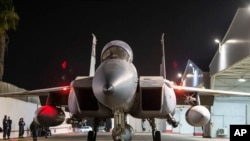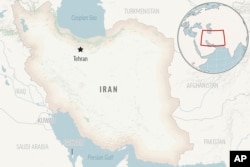
An attack on an Iranian police convoy Saturday in the country's restive southern province of Sistan and Baluchestan killed at least 10 officers, authorities said.
Details remain scarce over the attack in Gohar Kuh, some 1,200 kilometers (745 miles) southeast of the Iranian capital, Tehran.
Initially, reports simply described an attack by "miscreants" without more information. But shortly after, Iranian state media said 10 officers had been killed.
HalVash, an advocacy group for the Baluch people of Afghanistan, Iran and Pakistan, posted photos and video of what appeared to be a disabled truck painted with the green stripe used by Iranian police vehicles. One graphic photo shared by the group showed what appeared to be the corpses of two police officers in the front seat of the truck.
HalVash said the attack appeared to target two security force vehicles and all those riding in them were killed. The truck appeared to have only damage from bullets, rather than any explosive being used.
The state-run IRNA news agency said that Eskandar Momeni, the country's interior minister, ordered an investigation into the incident that it described as causing the "martyrdom of a number of police."
Authorities identified no immediate suspects for the attack, nor did any group claim responsibility. The assault came after Israel launched a major attack across Iran early Saturday morning.
The Baluch regions across the three nations have faced a low-level insurgency by Baluch nationalists for more than two decades. Verifying information remains difficult in Iran's Sistan and Baluchistan, which for decades has been home to violence involving heroin traffickers.
The province is one of the least developed parts of Iran. Relations between the predominantly Sunni Muslim residents of the region and Iran's Shiite theocracy have long been strained. Typical attacks involve hit-and-run assaults by militants in the region, like the Sunni militant group Jaish al-Adl, that kill a few security officials at a time.
However, there have been mass casualty attacks by militants in the past. In April, gunmen wearing explosive vests attacks several sites in the province, killing 10 before security forces gunned down 18 militants. Last December, another assault killed 11 and wounded eight others.
Meanwhile, the Taliban said they are investigating reports that Afghan migrants had been killed by Iranian security forces in the region earlier in October, an incident that threatened to further strain relations between the nations.








